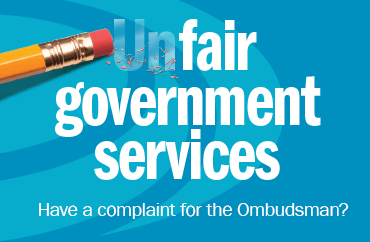A Long and Winding Road
**This featured case is one example of the concerns people have brought to us. Names have been changed to protect the identity of the people involved.
Nicole contacted us because she disagreed with Social Services’ decision to deny her request for funding under the Cognitive Disability Strategy (CDS) for her daughter, Megan. Nicole said that there was also a delay in processing the application, she wasn’t given enough information about the appeal process, and she was not given meaningful reasons for the application and appeal being denied.
Megan has several cognitive disabilities and needs assistance in most areas of her life, including caregivers for all her personal needs. She and her family are clients of Social Services’ Community Living Service Delivery (CLSD) program. When she was five, Megan went to elementary school, but could only attend for three hours every other day and had trouble adjusting. At the end of the school year, Nicole decided to homeschool her.
In July, Nicole’s CLSD worker helped her prepare an application for CDS Flexible Funding for speech therapy, travel costs to medical appointments and enhanced respite (in addition to what CLSD was already providing).
Over the next 20 months and for various reasons, the request was held, submitted, reviewed, sent back for more information, revised, resubmitted, considered, denied, reconsidered, recommended for approval, and denied. During this time, a policy change had occurred, and the speech therapy portion of the request had been removed.
The decision letter said the enhanced respite was denied based on the policy and gave no reason for denying the travel costs for medical appointments. It said the decision could be appealed to the CDS Cross Ministerial Appeals Committee (CMAC) but did not explain that there was a 30-day deadline, which had passed before Nicole actually received the decision letter. Her appeal was initially rejected for being late, but was eventually considered and then denied.
Our investigation into Nicole’s complaint considered two main questions.
Was the application process fair, reasonable and timely?
We found Nicole was not involved in – or even made aware of – several key aspects of the application process. Reasons for denials were not always provided or they were inaccurate. As a result, she was left out of several key decisions. When she was involved, she was not always given the right information. We found that the process took too long and CDS did not consider all the relevant information, but did consider irrelevant information. For example:
- Nicole was unaware of the first denial and did not get the decision letter.
- Nicole did not get the second denial letter until more than three months after it was issued.
- Nicole didn’t know why the travel costs for medical appointments were denied, so she didn’t know how to try to convince CDS to change its decision. Meanwhile, this delayed her exploring other options.
- The final denial letter said her respite request was denied because, “As per policy, a respite request for CLSD clients is not provided through Cognitive Disabilities Strategy.” This policy came into effect after Nicole submitted the application. The letter did not explain why the policy applied and more importantly, CDS told us the denial was actually based on a different reason: Nicole’s decision to homeschool Megan. Without this explanation, she could not provide relevant information in support of her application and appeal.
- CDS failed to consider that even if Megan had continued to attend school, she would only have been there 6-9 hours a week, that there was a high need for respite regardless of whether Megan was homeschooled, and that the family had challenges accessing respite.
CDS told us that it regretted not sending decision letters directly to Nicole after each decision and that it had already made changes to that process.
Was the appeal process fair and reasonable?
We found that Nicole was left out of or uninformed during the appeal process, while the original decision makers at CDS appeared to have a better opportunity to make their case. As a result, CMAC did not consider all the relevant information. It was also possible for a reasonably-informed person to conclude that the process could be biased. Finally, CMAC provided inadequate reasons for its decision. For example:
- Some of the CDS decision makers attended the appeal meeting, presented information and were available to answer questions, but Nicole did not have the same opportunity.
- A CMAC member contacted Megan’s former school division for information which was used to make the decision. Nicole did not know and was not given an opportunity to provide contrary or alternative information.
- CMAC told us its main focus with the respite request was whether there was an unmet need. Since Nicole was not told the real reason her application was denied, she did not have an opportunity to focus her appeal accordingly.
- CMAC did not consider how few hours Megan would be in school, the types and quantity of supports she would have received at school, or the family’s high need for respite, whether Megan was homeschooled or not.
- One of the CMAC members supervised the CDS employee who made the original decision. In our opinion, a reasonable, informed person may think that the member could not review the CDS employee’s decision in a fair and open manner and could be seen to be biased.
- CMAC’s decision letter said only that the original decisions about respite and travel costs were being upheld. This left Nicole with the same misconceptions she had formed based on the inadequate reasons that were given before the appeal.
Based on our findings, we made the following recommendations:
The Ministry of Social Services should review the complainant’s CDS application for travel expenses and additional respite again, considering all relevant information and providing the complainant with an opportunity to submit information related to the need to homeschool their daughter.
The application should be reviewed in a procedurally fair manner. The Ministry should ensure that anyone involved in the original decision making process or appeal is not involved in the reconsideration of this application.
Status: Accepted
After reviewing Nicole’s CDS application, Social Services accepted the respite portion and funded Nicole back to the date of the original application.
The Ministry of Social Services should collaborate with all the members of the CDS Cross Ministerial Appeals Committee to review and amend both the Cognitive Disability Strategy funding application process and the appeal process to ensure they each meet the minimal requirements of procedural fairness, including ensuring:
- Any individuals involved in making the original decision and in deciding any appeals are free of bias and can be reasonably seen to be free of bias, including ensuring that no one involved in making the original decision is involved in deciding the appeal of the original decision;
- Applicants and appellants are given notice that a decision is going to be made, provided with the information being used to make the decision, and given an opportunity to review the information and provide an explanation or alternative information;
- All decision letters include a statement of the decision, a summary of the information relied upon to make the decision, an explanation of how any contradictions in the information considered were reconciled, and all other relevant reasons for the decision; and
- All decision letters are drafted and sent directly to applicants by the decision maker within a reasonable time after the decision is made.
Status: Accepted
The Ministry of Social Services should review and update both the Cognitive Disability Strategy application and appeal forms to include a consent to the collection of personal information that permits both the Ministry of Social Services and the Cognitive Disability Strategy Cross Ministerial Appeals Committee to share personal information with other agencies and collect additional personal information from them for the purpose of considering applicants’ requests for Cognitive Disability Strategy funding.
Status: Accepted




